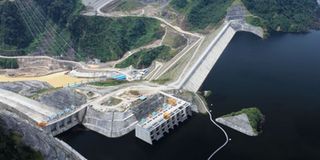Canada’s four hydroelectric dams near completion

Havre-Saint-Pierre. On a frigid night, the roar of heavy machinery chipping away at rock echoes through Canada’s boreal forest: in the far north of Quebec province, four massive hydroelectric dams that will produce “clean energy” for the northeastern United States are nearing completion
Flowing more than 500 kilometres (300 miles) through the wilderness, the Romaine River in the Cote-Nord region of Quebec is about to hit a literal wall at 51 degrees north latitude with the erection of the fourth and last power station.
Once completed, the construction project -- which started in 2009 -- will see the cold, clear waters of one of Canada’s longest untamed rivers flood surrounding lands claimed by indigenous tribes.
From a distance, the bright lights at the site where more than 800 heavy dump trucks, drills and giant backhoe loaders are in use look like reflections of stars in the night sky.
The teams from Hydro-Quebec are working on two fronts.
They are razing a mountain to make room for the power station. They are also erecting a dike 500 metres (1,640 feet) long and 90 metres high that will hold back the water to be used to generate electricity. Once fully operational in 2021, the four power plants on the river will cumulatively generate 1,550 megawatts. (AFP)
of electricity, enough to power a city or an estimated 1.5 million homes.
Quebec has a power surplus, so the government is hoping to sell the power produced here to its American neighbors to the south -- and in turn do its bit to help alleviate global warming.
The construction site extends over several kilometers: there is a full cement factory, an infirmary for workers, offices, a quarry and a dynamite depot.
“This is a major project -- there are many different stakeholders, many simultaneous activities, and many dangers to manage daily,” including inquisitive wolves and bears, says Christian Guimond, who is in charge of the dam’s construction.
Already four workers have died, which forced the public utility Hydro-Quebec to suspend construction in 2017 while it reviewed its workplace safety practices.
Costing more than Can$6.5 billion ($4.9 billion), it is among the top 10 largest infrastructure projects currently underway in Canada, ranking behind two nuclear plant refurbishments, three other hydroelectric projects and a new Toronto subway line.



